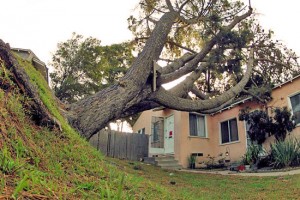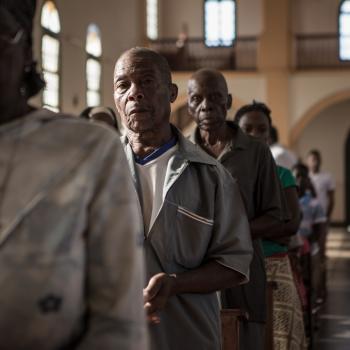 I stood Saturday morning and looked up at the massive oak tree broken about twelve feet up the trunk and fallen on my roof. At eight in the morning the temperature was eighty-seven degrees and heading toward a high of 105. We had no power, and word was it would be out at least a week.
I stood Saturday morning and looked up at the massive oak tree broken about twelve feet up the trunk and fallen on my roof. At eight in the morning the temperature was eighty-seven degrees and heading toward a high of 105. We had no power, and word was it would be out at least a week.
Another tree had smashed through the back fence and lay across the yard, its small top branches bent and broken on the far fence. The yard smelled like fresh-cut firewood.
Strange iridescent-green insects flitted around, bugs who normally live in the tops of those trees where we never see them.
Knocked from their nests, baby squirrels swarmed the yard. Small as hamsters they skittered and chirped and chased one another in confused play. There must have been forty of them. They are gone now, I don’t know where, but I have an idea—our neighborhood is not short on cats.
Though limbs rest atop the house, there isn’t much damage. A massive white oak outside my daughter’s window—we call it Gracie’s oak—caught the bulk of the falling tree, and it still hangs, the two trees’ branches clasped together like hands sprouting out into the sky a gnarled and broken here is the church… see all the people.
The arborist who came to give an estimate has names for everything. The way this tree has hit my tree and slid back onto its own trunk is known as a barber’s chair. A large branch broken and hanging is called a widow maker.
I know a lady who was made a widow in just this way: She and her husband were at a backyard barbecue. He was holding a beer and watching his daughters play and a fat limb fell on his head and killed him while the burgers smoked on the grill.
Trees are down all over town. Blocked roads, smashed power poles, cars, houses. The weather event that caused all this wreckage is called a derecho (Spanish for direct or straight ahead). I’d never heard of a derecho, but apparently the unrelenting heat created conditions right for this straight-on windstorm that blasted across the eastern U.S. at eighty to one hundred miles per hour.
When the windstorm hit so unexpectedly Friday night, my wife and I were in our basement watching the HBO show Treme.
On the show, a chef forced to close her restaurant and leave town after Hurricane Katrina comes back to visit. She rides on the newly reopened trolley, looking at her beloved but wounded New Orleans, and she is crying. The singing vagabond played by Steve Earle has just been mugged and shot dead in the street. Cops have shot kids, people are desperate, some still without homes, some trying to cobble a life together, exposed to the elements and predators—both in masks and dapper suits—running the streets. People are understandably angry and fearful and desperate. Some are suicidal.
After five days in the dark, our electricity is back. I spent five days cooking our meals on the backyard grill. I even made coffee on the grill, and sat outside in the morning air listening to the chainsaws and chippers and sirens ring out in every direction as I drank it.
All in all, it was a little uncomfortable—and we still have a tree looming over our bedrooms and must stay out of them until the arborist can get a crane and remove the tree without destroying the house.
We didn’t suffer. Not really.
It was more like a window to the suffering of New Orleans was briefly cracked open and we got a glimpse inside before it closed and we were once again out of the brutal sun in our cool dark homes.
In his novel Villages, John Updike’s protagonist muses that the two greatest arguments in favor of Christianity are the fact that we want to live forever, and this nagging sense that something is wrong, something is fundamentally broken. The first he dismisses as a byproduct of the evolutionary survival instinct. The second he claims is the stronger of the two. Something is wrong with the world.
People are doing a lot of good around here in the wake of the storm, as Karen Swallow Prior describes in her July 6, 2012 Think Christian post.
I think of a memorable line about misfortune from Ha Jin’s novel Waiting: “Every fist holds a gift.” That is true here too, but it doesn’t mean the fist hasn’t pounded and crushed, because it has.
From the backyard, through the tree’s twisted branches I see truck after battered truck of profiteers, riding the streets like revolutionaries, gripping their chainsaws like guns.
Many houses emptied by those fleeing the storm and heat are being broken into by looters. A group of homeowners near us discovered just such a thief the other night. In a fit of vigilante justice they attacked and beat the guy. How little it takes for our polite suburban niceness to collapse.
A friend asked me how anyone could not believe global warming is really happening, as these extreme weather events become more common, and more severe. I’m not a scientist, but it sure seems to be true.
Even if it isn’t quite that bad, would anyone believe that our relationship to the rest of the natural world is hunky dory? Our relationship with one another?
Last night we had another storm. Heavy rain and lightning and thunder. And more wind. We once again heard trees cracking and ripping outside the dark window, and again we took to the basement to sit in the dark and wait it out.
Gracie’s oak held. Our house is still intact. I imagine that the crooks were also taking cover somewhere during the storm. In these moments I feel what Updike writes:
Something is not right here. Something is broken.















